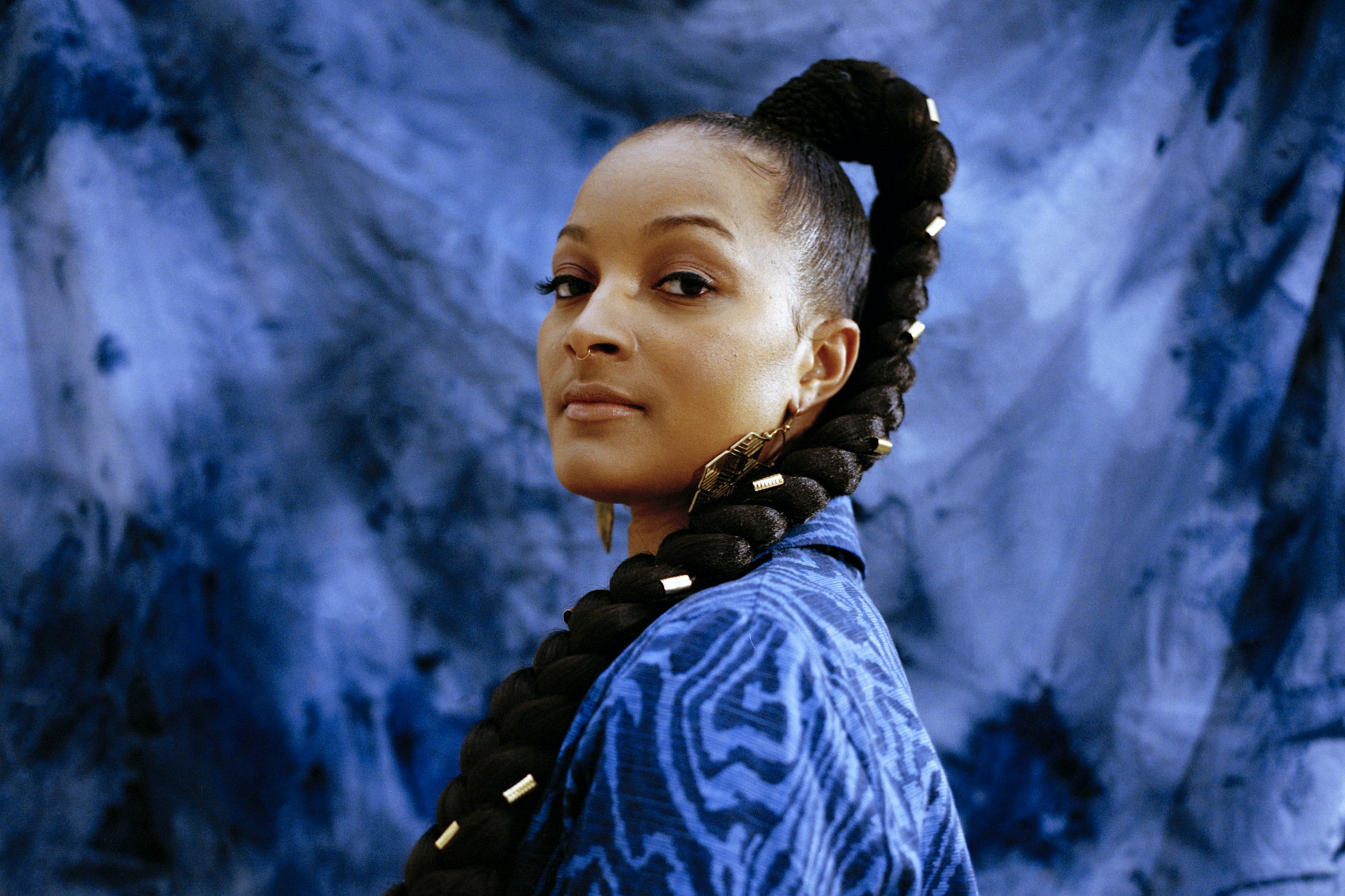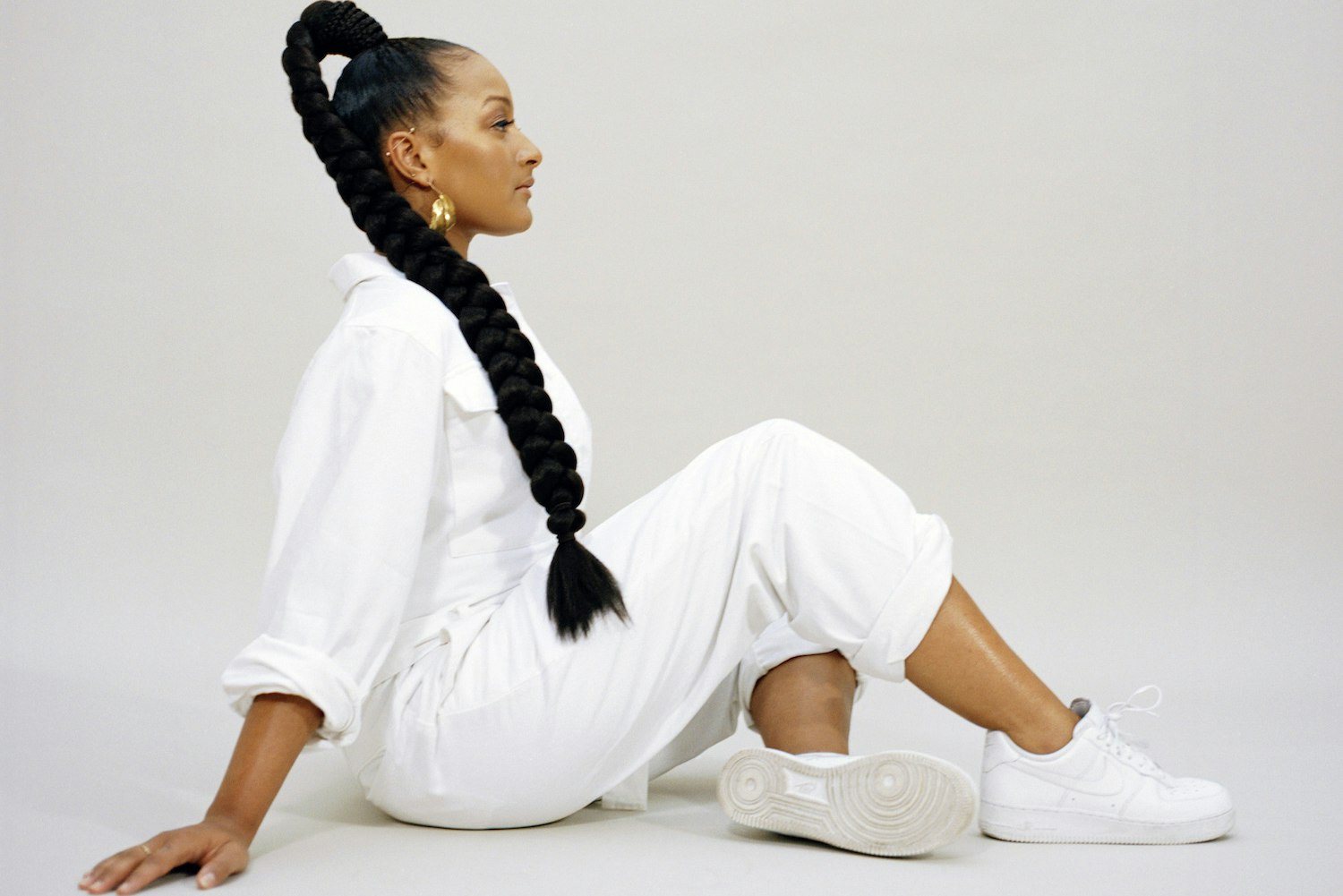Words by Emma Warren
The plants that surrounded Nubya Garcia and her band on their million-plus viewed Tiny Desk concert gained almost as much attention as their incredible music. Well, not quite – no plants are going to outdo those sounds – but they provided a notably lush and verdant visual backdrop to her geographically expansive and fired-up instrumentals. Her music, as showcased on her recent widely-acclaimed ‘Source’ album, draws on lively lineages of Great Black American music, London’s street-up evolutions of soundsystem culture, and Colombia’s folkloric cumbia music.
“I’m a real nature plant baby,” says the tenor saxophonist, composer, and bandleader. “But most of the plants for Tiny Desk were borrowed from [fellow London musician] Poppy Ajudha. I was living with her at the time because of the pandemic. I didn’t have a flat because I wasn’t supposed to be in London.”
That’s an understated way of describing Garcia’s pre-Covid schedule which involved headline international tours with her band and with Nérija, the other band she co-founded and which signed to Domino Records. Travel was out but her bookings moved online: she was one of only five musicians booked for Glastonbury’s ‘Home Edition’ at the start of lockdown and among other things, she made a neat video for audiophile headphone company AIAIAI Audio explaining her compositional process.
Like everyone, she reorganised herself once the pandemic hit. A friend let her use their studio once a week for writing, she has a small set-up at home, and she’s been using her local by-the-hour Pirate Studios for practice. This inevitably means sharing space with people across musical styles and skill levels. “That’s the beauty of it,” she says, “although it can get a bit annoying. I’m a real night owl so I’d go to practice at 10 pm – I like to do the morning and the night and then I have the whole day – and someone two doors down is having a jungle rave.” It was, though, a ‘saving grace’ during lockdown.
I feel like mics can really manipulate your sound and that really pisses me off if it’s not on purpose.
Mostly, of course, she’s an incredible sax player, bending notes mid-air and bringing a whole-body power and deeply warm and nuanced lyricism to her playing. She can send air through the sax, generating waves of energy and she can bring the sound down, low to the earth, gently insisting notes out of her sax and into our ears.
She composes music for her own band, bringing charts into the studio from which the band evolve the musical conversation, and wrote the score for a theatre run of A Streetcar Named Desire pre-pandemic. Film and TV are next in her sights, ideally for Steve McQueen whose award-winning ‘Small Axe’ films celebrated Black British life in ways as nuanced and engaging as one of Garcia’s solos.

She prefers to write at the studio but has a small set-up at home: a MIDI keyboard for inputting and writing and a Korg Kaoss Pad, although manipulating the X and Y axis with a finger is really hard while you're playing saxophone with both hands. “I did see someone playing with their foot once,” she says, “but I’m not getting my feet out on stage.” She also has decks and a Pioneer DJ controller for her burgeoning DJ sideline, a mixer, and ‘loads of records’ for her regular NTS radio show.
“I'm very obsessed with one Coles microphone,” she says, “I’ve been trying to get one myself but…money.” She uses it whenever possible for recording sessions, instead of EV’s RE20 which she prefers for live. “They both work, it's just for when I'm recording the RE20 just doesn't work as well,” she says. “When I listen back, I'm like, ‘that's not really what I sound like’. I like using the Coles because it's the most real-life version of what I do. I feel like mics can really manipulate your sound and that really pisses me off if it’s not on purpose.”
I want to be the person that adds stuff. I really want to sound like me.
As a classically trained musician – she graduated from Trinity Laban in 2018 – with stratospheric skill levels, she doesn’t need too much studio trickery because she can create so many sounds herself. Is her main requirement from gear, then, about accuracy?
She works with pedals a lot, like her Boss V20 and the MXR Carbon Copy delay, mostly because of the parameters on the Carbon Copy. “It really suits what I'm doing and I’ve learned how to work with it. Next, I'd like to get something to ease that on and off thing, like an expression pedal.”
It’s about controlling the space between the work as she’s written it and how it translates in the studio or on stage. “I want to be the person that adds stuff. I really want to sound like me. Sometimes I walk into a studio, and someone's like, ‘oh, I've got this amazing mic, the U47’. I’ll tell them it’s not going to work because it picks up too much. You can hear my breath, you can hear the keys. You can hear everything. And then lo and behold, we’ll spend ages on it and then have to switch it out. I know what works for me.”
A main compositional tool is conversation, something that is abundantly clear on the cumbia track on her recent ‘Source’ album. The track, ‘La Cumbia Me Está Llamando’, was created with Diana Sanmiguel from vocal percussive trio La Perla and was recorded during a trip to Medellín in 2019. Cumbia, she says, is a celebratory free conversation and commentary on life, something that’s very familiar in the music of her family lineage which covers Guyana, Trinidad, Venezuela, and the London Borough of Camden. “That’s what I’ve also got from the music of my culture, in the Caribbean. So it's this whirlwind of everything coming together, in how I approach music.”
The same is true for all the music she composes. “I write the tunes, but it's all within a conversation,” she says. “I’ve given you [the musicians] the story, but what do you think about it? What are you saying on top of that? It can develop and change forever. It’s not going to be the same two and a half minutes forever. That is the purpose of improvised music or jazz or Black American music, whatever you want to call it. That is the lineage that we and the people that I play with have come from.”

Often, the people she plays with are people she grew up with: she’s known fellow London big hitters Moses Boyd, Theon Cross, Cassie Kinoshi, and the assorted members of Kokoroko and Ezra Collective since they were young teens. They met at jams or on music programmes run by jazz educators like Tomorrow’s Warriors, or on mentoring programmes with London composers like pianist Nikki Yeoh – a time she describes as ‘a compositional first…a period that really influenced me.’
When she’s writing for her band – Joe Armon-Jones on keys, Daniel Casimir on double bass, Sam Jones on drums – she’s writing for people whose bands she’s also been in. “We know each other so well, that very little needs to be said anymore because the tune as it's written calls for certain energies, which gets delivered. There’s a common language. There’s a shared individualism that comes together in the collective and it changes with each person's project.”
I just write what I would want to hear, which is music as a place to let go and a place to be present with other people.
Nubya Garcia live is an immersive experience, where the compositions are reconnected directly to their roots in movement – dancefloor music in the sense of music that makes you move.
“It's at the kind of core of everything, for me, compositionally, and musically,” she says. “I don’t want to overthink it, like ‘I want people to dance to this’. That can completely ruin the whole composition. I just write what I would want to hear, which is music as a place to let go and a place to be present with other people, a therapeutic space – and that involves physical movement.”
The pandemic has reminded people how important it is to listen to music collectively, she says. “I write music for people to let go to, and move. It could be a ballad and you could be swaying with your eyes closed. You’re still moving.”
